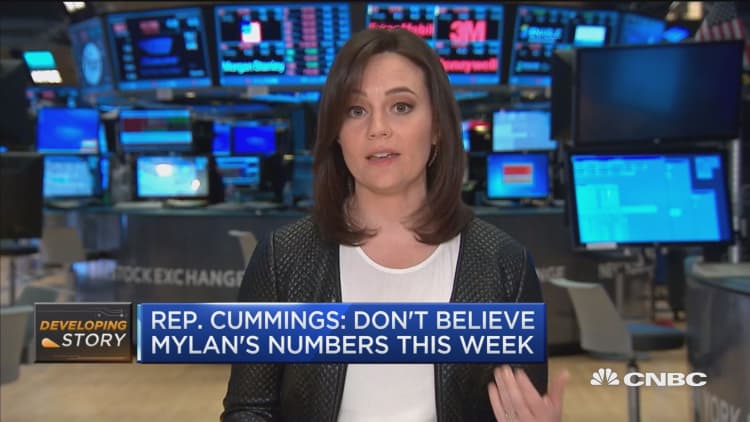This congressman doesn't buy — or "believe" — Mylan's latest story about its EpiPen profits.
Rep. Elijah Cummings blasted Mylan on Monday after it embarrassingly revealed its CEO — during congressional testimony last week —significantly understated the amount of profit the big drugmaker books on sales of its life-saving EpiPen devices.
Cummings, D-Md., is the ranking minority member of the House Oversight and Government Reform Committee. Mylan CEO Heather Bresch told that committee last week that Mylan had profit of $100 for a two-pack of EpiPens, the auto-injection devices that counteract potentially fatal allergic reactions in users.

But on Monday, Mylan said that the company actually has a pretax profit of $160 for the two-packs.
The post-tax profit totals $104, according to the company, which is under fire from consumers and Congress for having hiked the price EpiPens more than 500 percent in recent years. Its list price currently runs $608.
Bresch's testimony last week did not include the disclaimer that the profit she was stating was post-tax, not pretax.
Mylan told The Wall Street Journal on Monday that including the U.S. tax rate for the profits of products is "standard" and that Bresch did not intend to be unclear when asked about the profit rate.
In a statement to CNBC, Mylan said, "Tax is typically included in a standard profitability analysis and the information provided to Congress has made clear that tax was part of the EpiPen Auto-Injector profitability analysis."
"In fact, Mylan has provided Congress with a detailed analysis of EpiPen Auto-Injector profitability," said the company, which included a link to that analysis with its emailed comment. "It also is important to note that use of a statutory tax rate for the jurisdiction being analyzed (in this instance, the U.S.) is standard. Just as we did not use a blended global tax rate, we also did not allocate corporate expenses associated with running the business, which would have further reduced its profitability. We believe it is most appropriate, and conservative, to focus entirely on EpiPen Auto-Injector specific costs and associated taxes."
But Cummings wasn't impressed with Mylan's new math.
"We didn't believe Mylan's numbers last week during their CEO's testimony, and we don't believe them this week either, which is why we gave them 10 days from the date of our hearing to produce their internal files," Cummings said.
"They have until Friday to give Congress the underlying documents we asked for back in August so we can finally determine the company's actual profits in each year for the last decade," Cummings said.
A spokeswoman for Rep. Jason Chaffetz, R-Utah, chairman of the House Oversight and Government Reform Committee, declined to comment on Mylan's restatement of its profit on EpiPens. The spokeswoman pointed to comments on EpiPen profit that Chaffetz made when Bresch testified.
"I find that a little hard to believe," Chaffetz said last week after Bresch claimed Mylan's profit was just $100 per two-pack. "When the juice [the epinephrine in the device] is a dollar, and you're selling it for $600, there's some room for profit."
"It just doesn't smell right," Chaffetz said later. "It doesn't pass the basic sniff test."
A congressional source said that if there is evidence that a company intentionally provided false information to Congress, then there possibly could be a criminal probe and prosecution.
However, prosecutions for lying to Congress are extremely rare. A 2007 study found that in the prior 60 years, only six successful prosecutions for perjury or related charges have been achieved, a rate of just 1 per decade.
This story has been updated to include a comment from Mylan about the EpiPen profitability analysis that it provided to Congress.


